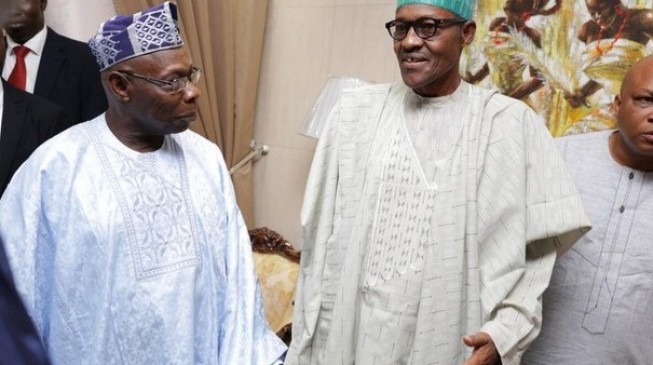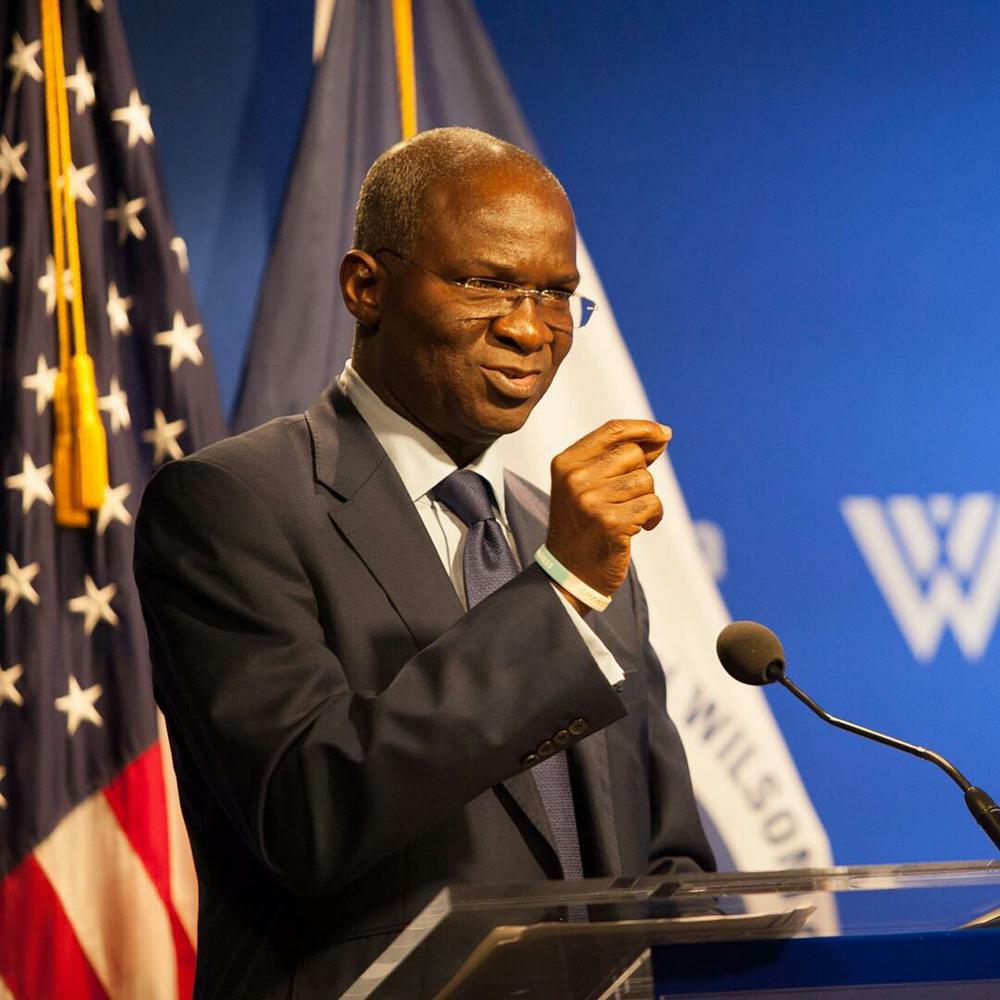National Assembly: How relevant are Opeyemi, Ndume, others as Senate Leader, Chief Whip, etc?
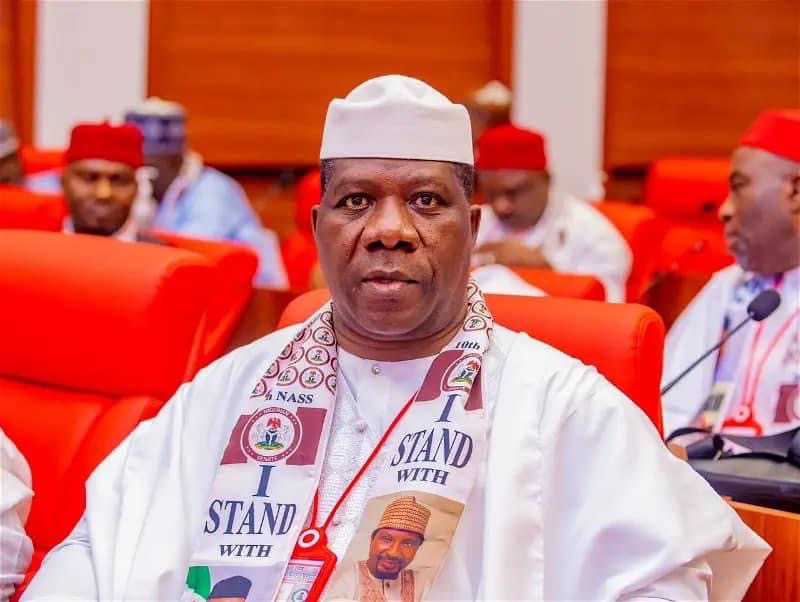
Key Points:
-
Opeyemi, a Tinubu protege, is the link person between FG and Senate
-
Ndume shall advocate the interests of the APC in the Upper Chamber
-
Senate Minority Leader Simon Mwadkwon must enter the big shoes left by Awolowo, Tarka to make impact in Senate.
-
House Leader Julius Ihonvbere is an asset to the legislature for his experience and intellectual prowess
-
The opposition must provide alternatives to APC’s policies, projects and programmes.
By Theophilus Abbah
On July 4, 2023, the National Assembly announced the elected principal officers who shall play significant roles in the lawmaking body. The roles of the Senate President, Godswill Akpabio, and Speakers of the House of Representatives, Tajudeen Abass, who hold the gavel and strike the table to affirm the finality of their decision, are fairly known. But not those of some of the principal officers. The officers elected on Tuesday, July 4, 2023 are as shown in the table below:
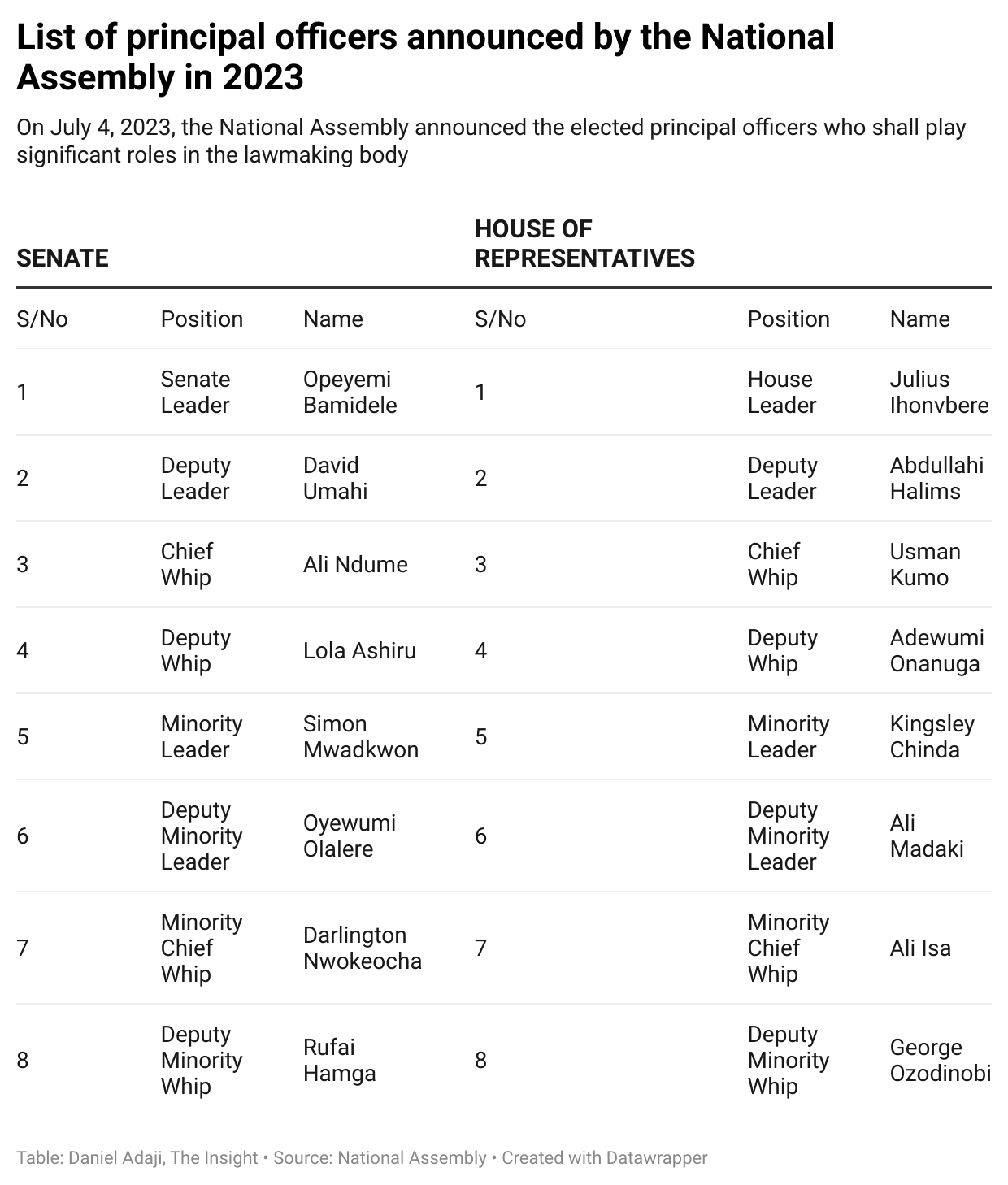
So what are their statutory roles and responsibilities? How will they carry out their assignments under the regime of President Ahmed Bola Tinubu? Below is an insight into their antecedents and how they are likely to perform their legislative functions in the 10th National Assembly..
-
Senate Majority Leader
Senator Michael Bamidele Opeyemi of the All Progressives Congress (APC) from Ekiti Central Senatorial District in Ekiti State was voted in as the Senate Majority Leader. His election to that position was very strategic for the Tinubu government.
Opeyemi has been a political son of President Bola Ahmed Tinubu. In 2000, Opeyemi was Senior Special Assistant to Governor Tinubu on Political and Intergovernmental Relations in Lagos State. Later, he was appointed as Commissioner for Youth, Sports and Social Development. From 2007 to 2011, Opeyemi was Commissioner for Information and Strategy under Lagos Governor Babatunde Fashola, having been recommended for that position by Tinubu.
Senator Opeyemi has since been loyal to the Tinubu agenda, and he has benefited from it greatly, as he was a two-term member of the House of Representatives, and now two-term Senator of the Federal Republic of Nigeria, elected from his home-state Ekiti. In no small measure, the Senate will work harmoniously with the Federal Government – with Opeyemi as the Senate Leader. Though Senate President Godswill Akpabio and Deputy Senate President Barau Jibrin preside over the Upper Chamber, it is Senate Leader Opeyemi who may be the most powerful of the three, because of his long-standing relationship and loyalty to Tinubu.
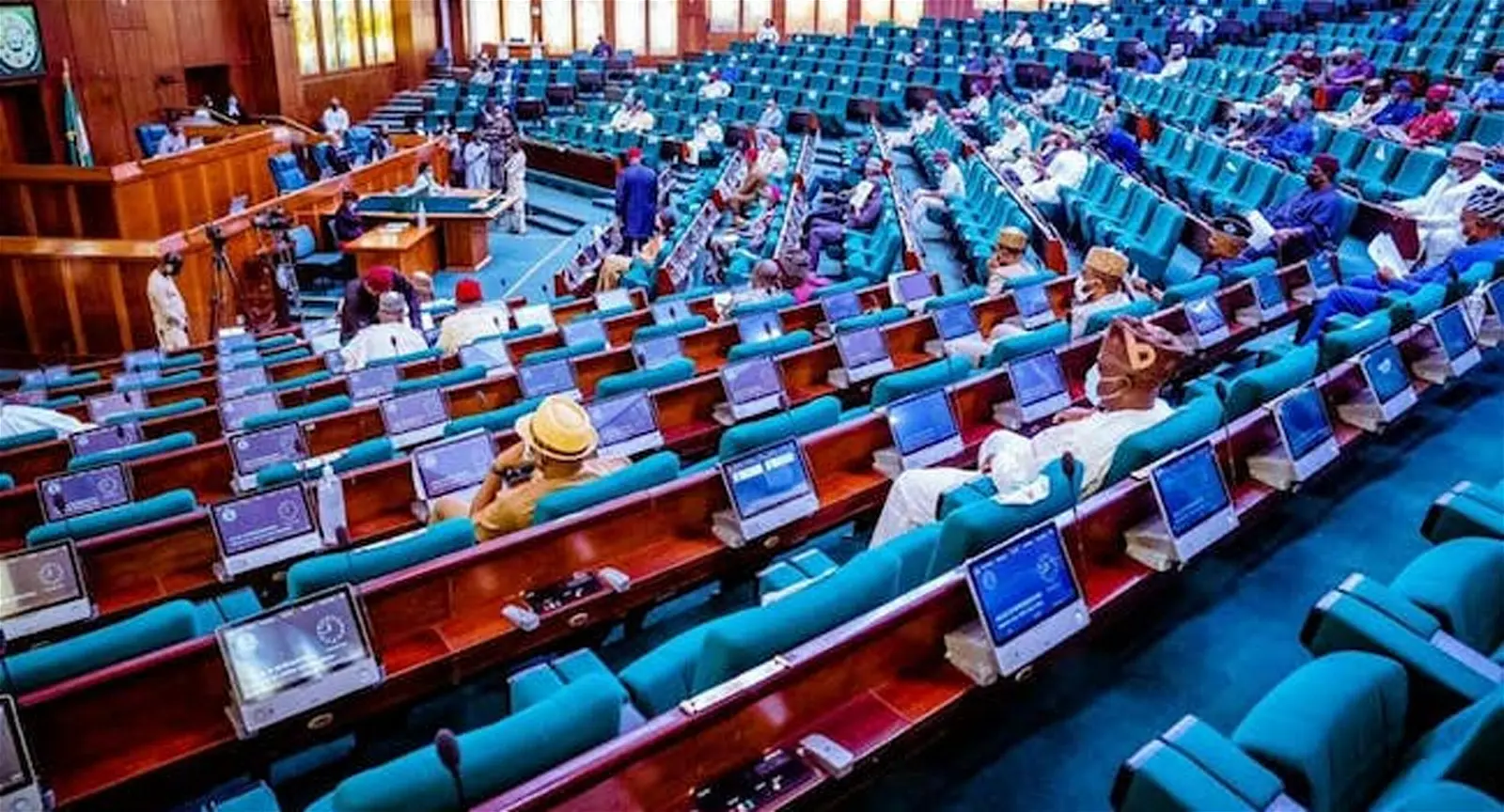
National Assembly in session
In both presidential and parliamentary systems of government, the Senate Majority Leader is the leader of the Senate, the liaison between the Upper Chamber and the Federal Government. Under the parliamentary system, any one occupying that position plays a role in the cabinet. He is central to the daily activities/business of the Senate. He is the senator who prepares the legislative schedule of activities in the Senate on days that the Upper Chamber would sit, like scheduling the bills to be debated and calling such bills before the debates begin.
But it is not just a duty, but the Senate leader ensures that bills and motions in the Senate align with the ideology, aspirations and interests of the party in power. He is, therefore, the hub of the business of the Senate, and all committee chairmen liaise with him to ensure their bills are presented and debated by the committee of whole. In some climes the Senate Leader is usually chairman of some‘Grade A’ committees. Though the Senate Majority Leader does not preside over the Upper Chamber, he is seen as the third in command; he is usually acknowledged by Senate President first before other senators. His colleagues lobby him earnestly, if they want their bills and motions to be prioritized in the Upper Chamber.
The Deputy Senate Majority Leader, who is former Governor David Umahi (APC, Ebonyi South), shall deputize for the Senate Leader Opeyemi, but he would depend largely on Opeyemi, if he much make much impact. Coming for the Executive arm as governor of Ebonyi State, Umahi is still a green horn in legislative matters. Therefore, for him to navigate effectively in the Senate, he would still need to chew the Constitution of the Federal Republic of Nigeria, and memorize the Senate Rules, a document that is like the Bible of the Upper Legislative Chamber.

Deputy Senate Leader, David Umahi
Perhaps, the former governor got the position in order to quench the thirst of the South-East to be represented symbolically in the power sharing in the National Assembly. However, there are more experienced candidates in the Senate from the South-East who would have done the job effectively. As it stands, Senator Umahi, at the initial stage has to do a lot of learning the books and the ropes to master the craft of senate leadership. He would also have to win the confidence of the Federal Government for him to be an effective link-man between the Upper Chamber and Aso Rock. In an effective system, Opeyemi and Umahi must work together to ensure proper management of the Senate. For both as well, they need to boost their interpersonal relationship with other senators, especially those in the opposition, to be able to succeed. It is not enough to be in the good books of the Federal Government.
- Senate Minority Leader:
The Senate Minority Leader emerges from the ranks of the opposition political parties. Simon Mwadikwon of the Peoples Democratic Party (PDP) from Plateau State, was favoured for the position, though it was aggressively contested by supposed heavy-weights in the PDP. Senator Mwadikwon’s emergence came as a surprise to many, but it may have been as a result of the power-play between the camps of former President Atiku Abubakar and former Rivers State Governor Nyesome Wike over the person to occupy that position. The Atiku camp wanted the job given to former Sokoto State Governor Aminu Tambuwal, while Wike’s camp wanted the position given to Senator Agom Jarigbe, representing Cross River North. Both lost out to Senator Mwadikwon.
The Senate Minority Leader is the captain of the opposition parties’ senators in the Upper Chamber. He, therefore, canvasses the position, interests, and disposition of opposition parties in the Senate. He brings to bear the policies of the opposition parties, protects the rights of minority parties, and nominates minority senators to committees of the Senate. An effective minority leader presents robust alternatives to policies and strategies of the ruling party, and could influence changes in policies of government with sound argument.
The Senate Minority Leader is the captain of the opposition parties’ senators in the Upper Chamber
If the Senate Minority Leader knows his onions, he would be very influential in the legislature and even in government. Some of the powerful opposition figure in the First Republic parliament was the late Obafemi Awolowo of the defunct Action Group. He was respected by the federal government of Abubakar Tafawa Balewa, and espoused his own ideology so firmly that he was thrown into jail for allegedly plotting to overthrow the government. In the North, the late Joseph Tarka, who was elected into the federal parliament in 1954 under the United Middle Belt Congress (UMBC), and later in 1958 as shadow minister of commerce, played an influential role in the opposition party. He firmly advocated for the creation of the Middle Belt Region, in pursuit of the ideology of equal opportunity for minority ethnic groups in northern Nigeria.
Even in the Second Republic when the late Shehu Shagari was president, the minority leaders had a very strong and respected voice in the parliament. In his autobiography, Shehu Shagari: Beckoned to Serve, the late president devotes a chapter to his struggle with the opposition elements, especially in the federal legislature. The opposition scrutinized the annual budgets and argued against line items so vigorously they succeeded in striking them out of the Appropriation Act – and Shagari could do nothing about it.
In the book, the author wrote: “In the Senate, non-NPN senators had also been making mischeif. Thanks to their majority, it was decided on November 16, 1979 to refuse any pay to Presidential Liaison Officers (PLOs) because the Office was not in the Constitution… My appeal met with square refusal in the face of fierce UPN-led oppostion. On June 10, 1979, a N1.63 million proposed vote for state branches of federal secretariat was struck off the 1980 draft budget on the belief that it included PLOs’ pay…” (243).
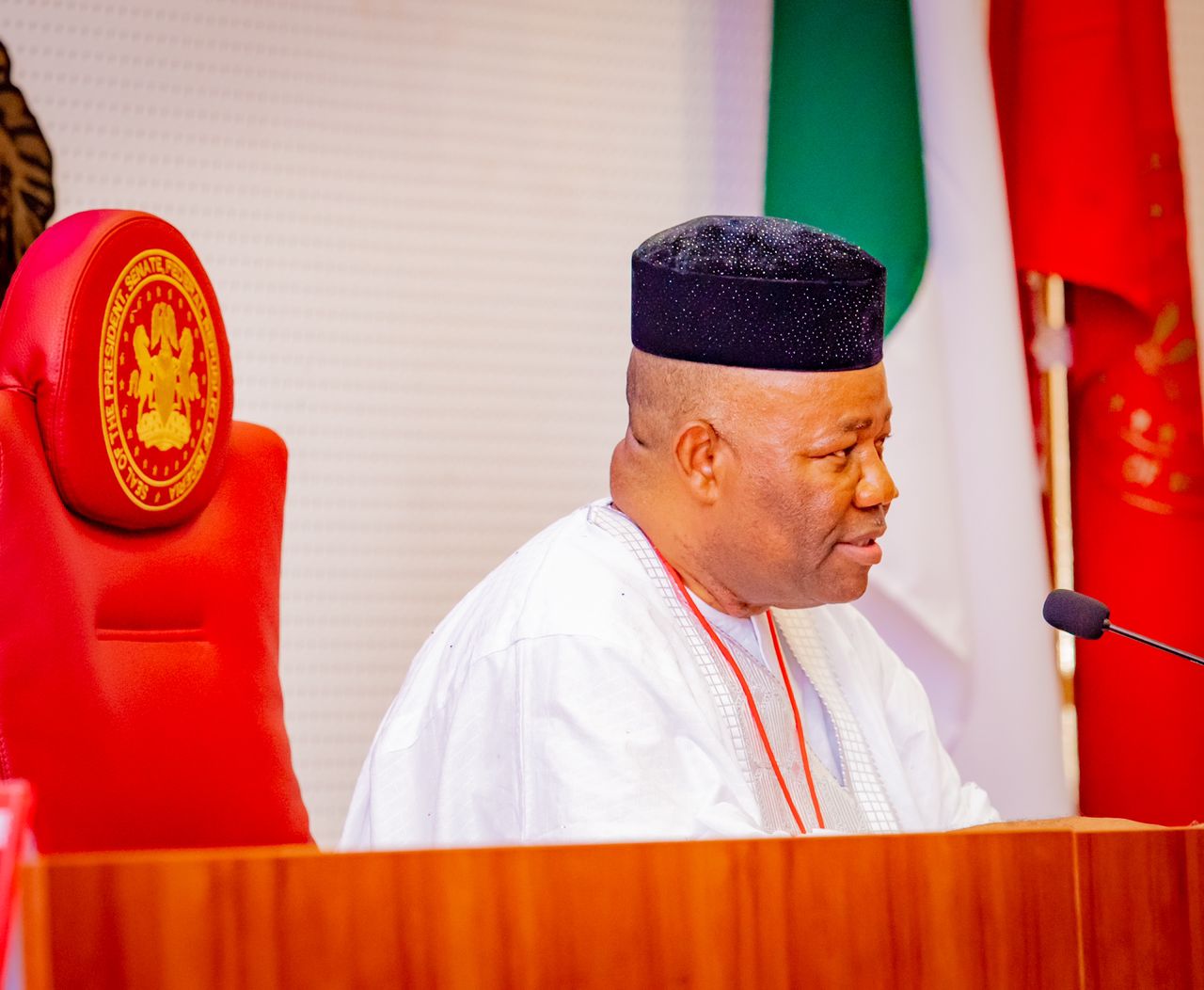
Senate President Godswill Akpabio
That experience was totally different from what obtains in today’s parliament where the Senate and House literally approved without any serious debate every request from the ruling party in government. In some cases, leaders of opposition parties were wooed by the ruling party to jump ship. For instance, Senator Godswill Akpabio was minority leader – of the PDP – from 2015 to 2019. Strangely he decamped to the APC ahead of the elections, and was rewarded with a ministerial appointment, as the Minister of the Niger Delta Affairs.
Senator Mwadikwon and his deputy, Oyewumi Olalere, (PDP, Osun) have a lot of work to do to provide a vibrant opposition in the Senate, considering the fact that the Senate Leader is a Tinubu lackey. Constructive criticisms are very good for any democracy; they help to ensure that government policies and strategies are well thoughtout and are for the good of the general public. The Minority leaders must home the interests of the PDP, other opposition parties and the majority of Nigerians.
The focus of the Chief Whip is to ensure that bills and motions sponsored or supported by the ruling power prevail in the Senate
- Chief Whip of the Senate:
Senator Ali Ndume was elected as Chief Whip of the Senate, a position that projects him as the embodiment of the APC, the link between the ruling party and the Senate. Senator Ndume assumes that position with a wealth of experience in the Nigerian legislature. He was first in the House of Representatives, and a Third Term Senator of the Federal Republic. In 2015, when Senator Bukola Saraki was Senate President, Senator Ndume was Senate Leader, though his defence of the former Economic and Financial Crimes Commission (EFCC) Chairman Ibrahim Magu, cost him that position. Very vocal and loyal to the APC, Ndume will do the job effectively because of his relationship with the party and even opposition elements in the Senate. The Chief Whip always ensures that the programmes, interests, projects and objectives of the ruling party are canvassed on the floor of the Senate.
In summary, the focus of the Chief Whip is to ensure that bills and motions sponsored or supported by the ruling power prevail in the Senate. Therefore, he ensures that at crucial Senate meetings where voting would take place, many senators elected under the banner of the ruling party are in attendance. Not just to be in attendance, but he shall persuade them to vote in support of the position of the party. In some cases, he could persuade even members of the opposition to support the ruling party’s position. He plays a crucial role at the Senate’s executive sessions, and canvasses for juicy committee positions for senators who are loyal to the party. Senator Ndume will be supported by Lola Ashiru, (APC, Kwara State).
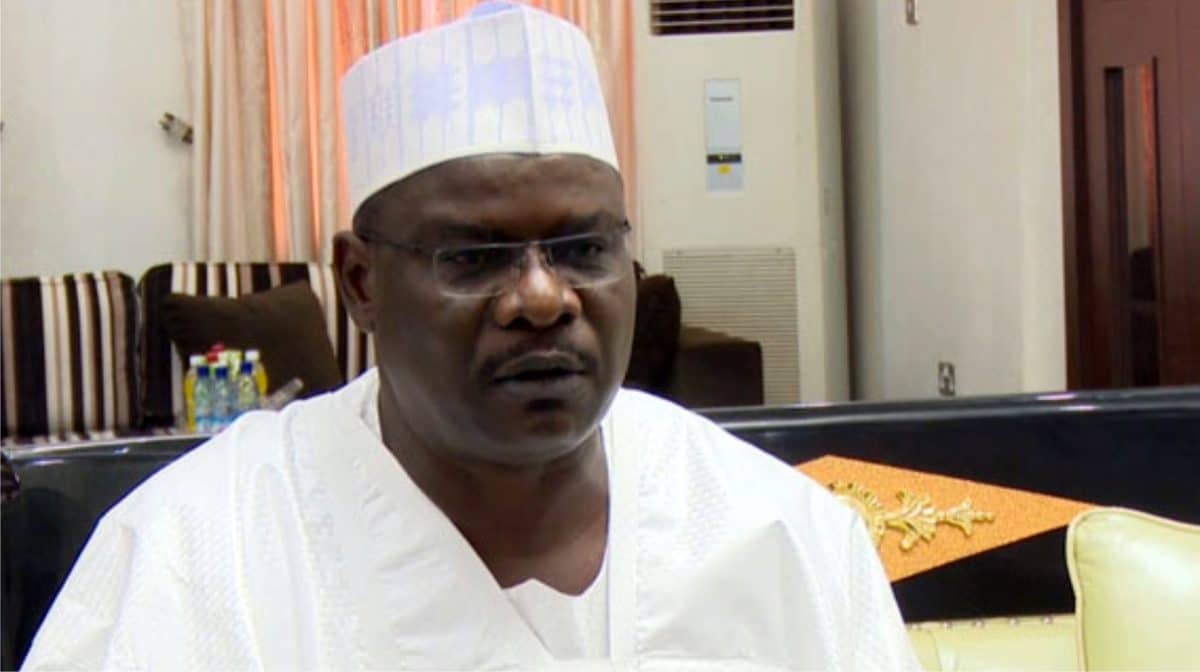
Chip whip, Senator Ali Ndume
- House Majority Leader: Julius Ihonvbere (APC, Edo) is one of the eggheads in the House of Representatives, with a long history of participating in high-level politics and governance as a member of the then ruling Peoples Democratic Party (PDP). A professor of Political Science, Ihonvbere was a speech writer to President Olusegun Obasanjo, and later the retired General’s Special Adviser on Policy and Programmes Monitoring. He was also Secretary to Edo State Government. An intellectual of high reputation, Ihonvbere, as House Majority Leader, will play similar roles as Opeyemi in the Lower Chamber of the National Assembly. He will be central to the daily activities of the House. Deputy House Majority Leader Abdullahi Halims (Kogi, APC) as the name implies, deputises for Ihonvbere to organize the daily parliamentary activities in the House of Representatives. Depending on how experienced and influential he is, Halims may play the role of a partner, not necessarily a deputy, in organizing the affairs of the House.
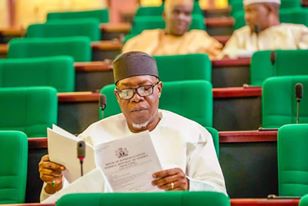
House Majority Leader Julius Ihonvbere
- House Minority Leader: The Minority Leader in the House of Representatives, Kingsley Chinda, plays a similar role as the Senate Minority leader. He canvasses the position of opposition parties, seeks to entrench its interest, and lobbies for juicy committee positions for members of the opposition parties. As there are multiple opposition parties, they must come together to influence the daily business of the House. The Deputy House Minority Leader is Ali Madaki. He is expected to work hand-in-hand with Chinda to project the positions of the opposition parties in the House.
Opeyemi has been a political son of President Bola Ahmed Tinubu
- Chief Whip of the House: Usman Kumo (APC, Gombe). His role is similar to that of Ndume in the Senate. He is to help organise opposition parties contributions to parliamentary business; he is also responsible for making sure the maximum number of their party members vote, and vote the way their party wants. His deputy is Adewumi Onanuga (APC, Ogun).
Dr Abbah is a Fellow of the Chartered Institute of Forensic Investigations and Fraud Examiners of Nigeria.
The Insight Report
Nigeria Coverage

